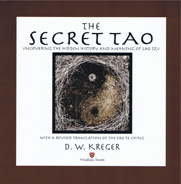
 |
The Secret Tao: Uncovering the Hidden History and Meaning of Lao Tzu
by D.W. Kreger
Windham Everitt Publishing
A psychologist with a background in archaeology and a personal interest in the Tao Te Ching, D. W. Kreger explores this treasured philosophical work. By tradition, its composer, Lao Tzu, was an archivist, contemporary to Confucius, who penned the Tao before he departed the royal house. But might he have been transcribing already ancient scripture? In looking at archaeological evidence, Kreger believes that the Tao sprang from an earlier culture where the worship of the earth mother predominated—a less materialistic, more natural society. Based on his study, Kreger has created his own interpretation of the Tao in two segments: a literal presentation of the original wording (almost as sounds, rather than cogent phrases); and a rendering of those sounds to express concepts like the natural balance of the masculine/feminine and the ills of materialism.
Kreger organized his book in three sections: his archaeological/historical investigation of the text, the verses themselves, and “my own perspective on what the Tao is.” He includes a depiction of the original Chinese characters alongside his own literal and figurative English wordings. He carefully provides details of his “telegraphic” translation method, analyzes significant linguistic points, and lists reference materials. Kreger’s rendering sensitively advances our understanding of the original passages in numerous ways, infusing them with current terms like “sustainable” and feminist ideals such as that “the Universe is the Mother of Creation.” Thus, The Secret Tao subtly modernizes the ancient text, stretching and expanding, but not overriding, its intent.
RECOMMENDED by the US Review